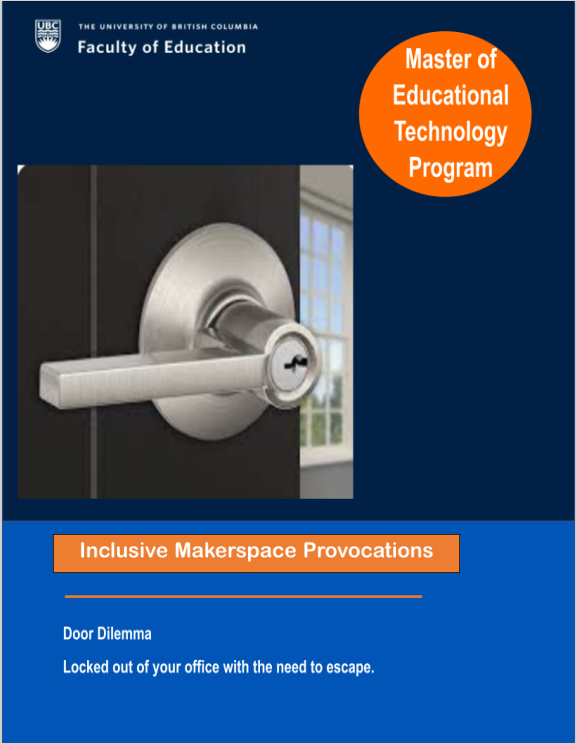
Provocation #1
Soar – By Alyce Tzue
What a powerful film, it conveys so much without the use of any dialogue, the disappointment and frustration are palpable from both characters. It also shows the importance of working together both for motivation and for alternate ideas. If the two characters had been alone it is possible, even likely that they would have given up. Instead, they followed the iterative process of testing and rethinking towards a successful conclusion.
The film speaks so strongly to CLT #1 and the description of the maker mentality, from the resilience to keep on trying after each unsuccessful attempt, to the creative and critical thinking skills needed to analyse the outcomes and come up with alternatives, and finally the hacker mentality of finding new and unorthodox uses of the materials at hand (Cohen et al., 2017; Edutopia, 2018; Halverson & Peppler, 2018; Oguntala, 2016).
It would be a good film to use to teach resilience, that is okay to be frustrated if something doesn’t work, but not to give up, especially before starting a large project with a class of any size, age or subject. Have students break down the apparent thought processes of the characters, as a group, to identify the steps of the design and build process.
It would also be a great film to use with students who are learning English, or any other dominant language, as there is no dialogue to cause confusion. It also shows how people/students can work together successfully, even if they are from different cultures and don’t speak a common language and so can they!
References:
Cohen, J., Jones, W.M., Smith, S. & Calandra, B. (2017). Makification: Towards a framework for leveraging the maker movement in formal education. In Proceedings of Society for Information Technology & Teacher Education International Conference 2016 (pp. 129-135). Chesapeake, VA: Association for the Advancement of Computing in Education (AACE). https://www.learntechlib.org/primary/p/174191/
Edutopia. (2018, November 16). Learning problem solving and growth mindset in a makerspace. [Video]. YouTube. https://youtu.be/oQvcbLmNfok
Halverson, E. & Peppler, K. (2018). International Handbook of Learning Sciences: The maker movement and learning (pp. 285-294). DOI: 10.4324/9781315617572-28
Oguntala, A. (2016, April 30). Re-imagine the future. [Video]. TedTalk. https://www.ted.com/talks/angela_oguntala_re_imagine_the_future

Provocation #2
Love Has No Labels – By Ad Council
This video/ad was very powerful being touching and stirring for me. The x-ray board showing only the humanity of the individuals. Since I am not an expert on the human skeletal system, I was left wondering what would be revealed when they emerged around the corner. It removed all preconceptions of race, culture, ability, religion, and sexuality and revealed only true expressions of love and, like many in the filmed audience, I was surprised by some of the reveals. On a technical level I was wondering how the display worked, some of the magic was lost when I realized that the “x-ray” images were likely prerecorded, and the people/actors were appearing around the corner on cue.
I was immediately thinking about how the video could be used in my school to spark conversations, to be a provocation much like it was for us, as it shows that we are all the same/equal on the inside and that we should be looking at people as people, and since we are all the same on the inside, love is love, no matter the wrapper. Pride month immediately came to mind, though being June, it is likely too late in the school year to be effective. During the opening weeks would be a good time as it would help set the stage for the rest of the year.
It is important to note, as was brought up in the discussion that followed that the reaction to the clip would be very different in other parts of the world, especially in areas that the LGTBQIA2S+ movement has not advanced as far, or as is the case in Uganda is being outlawed and that people from these areas bring these cultural lenses with them (Equal Rights Coalition, 2023). Even within our own society, while for some this would bring great hope and break down barriers and prejudices, for others it would make them very upset and angry.
One key takeaway from that conversation, an ah ha moment, was that it is easy to be tempted to call people who are opposed to the LGTBQIA2S+ community and their push for protection, equality rights, and inclusion backward. It would seem to be a prime case of equity, diversity, inclusion, decolonization and anti-racism (EDIDA) frameworks at work but by saying, especially of other cultures, that they are backward and that they have to think the way that we do to be correct and enter into the modern, or cultured, world we are ourselves are participating in a form of discrimination verging on colonialism (EDIDA Frameworks – Virtual Inclusive Makerspace Initiative for the Master of Educational Technology, n.d.). Following the EDIDA frameworks we need to be welcoming to them and recognize that they carry with them a cultural lens that has led them to their beliefs. While we certainly don’t have to agree with their beliefs, we need to recognize and respect them to create and open and safe spaces, a difficult balance as mentioned by Ahmadi et al. in CLT #5 (2019, p.9). From there we can enter into open discussion about the topic/issue. The is very important to me as a Social Studies teacher as the increasing diversity of our classrooms means that we need to be prepared to have these discussions on topics that were not discussed or disputed in the past.
Reference:
Ahmadi, M., Weibert, A., Wenzelmann, V., Aal, K., Gäckle, K., Wulf, V., & Marsden, N. (2019). Designing for Openness in Making: Lessons Learned from a Digital Project Week. Proceedings of the 9th International Conference on Communities & Technologies – Transforming Communities, 160–171. https://doi.org/10.1145/3328320.3328376
EDIDA Frameworks – Virtual Inclusive Makerspace Initiative for the Master of Educational Technology. (n.d.). Retrieved July 26, 2023, from https://inclusivemakerspace.met.ubc.ca/edida-frameworks/
Equal Rights Coalition. (2023, May 30). Statement by the Equal Rights Coalition on the Anti-Homosexuality Act in Uganda – Canada.ca. Global Affairs Canada. https://www.canada.ca/en/global-affairs/news/2023/05/statement-by-the-equal-rights-coalition-on-the-anti-homosexuality-act-in-uganda.html

Provocation #3
Door Dilemma Provocation
Completed with Michelle Desgroseilliers, James Halliday & Allison Hubenig
Completed Provocation Package
Reflection
The skills that we identified as needed to successfully escape the room match almost exactly with the components of the maker mindset/mentality in CLT #1, specifically self-regulation, critical thinking, creative thinking, the hacker mindset, being innovative, willing to take risks, adaptability, problem solving, a mechanical aptitude, and spatial thinking (Cohen et al., 2017; Edutopia, 2018; Halverson & Peppler, 2018; Oguntala, 2016).
One thing that we, or at least I, were reminded of as we were wrapping up and doing a final read of the scenario is the importance of breaking down what is known and not relying on assumptions. The scenario describes that there was a sound on the other side of the door, indicating that they knob had fallen off on the other side of the door and that the handle might still be in place on our side with ‘escape’ as close as turning the handle, we had been operating under the assumption that they knob was missing on our side of the door. To use making as an analogy, test to know for sure, if you are correct in your belief, great, if not, you now have more information than you did before the test and know what doesn’t work.
References
Cohen, J., Jones, W.M., Smith, S. & Calandra, B. (2017). Makification: Towards a framework for leveraging the maker movement in formal education. In Proceedings of Society for Information Technology & Teacher Education International Conference 2016 (pp. 129-135). Chesapeake, VA: Association for the Advancement of Computing in Education (AACE). Retrieved from http://www.learntechlib.org/p/171660
Edutopia. (2018, November 16). Learning problem solving and growth mindset in a makerspace. [Video]. YouTube. https://youtu.be/oQvcbLmNfok
Halverson, E. & Peppler, K. (2018). International Handbook of Learning Sciences: The maker movement and learning (pp. 285-294). DOI: 10.4324/9781315617572-28
Oguntala, A. (2016, April 30). Re-imagine the future. [Video]. TedTalk. https://www.ted.com/talks/angela_oguntala_re_imagine_the_future

